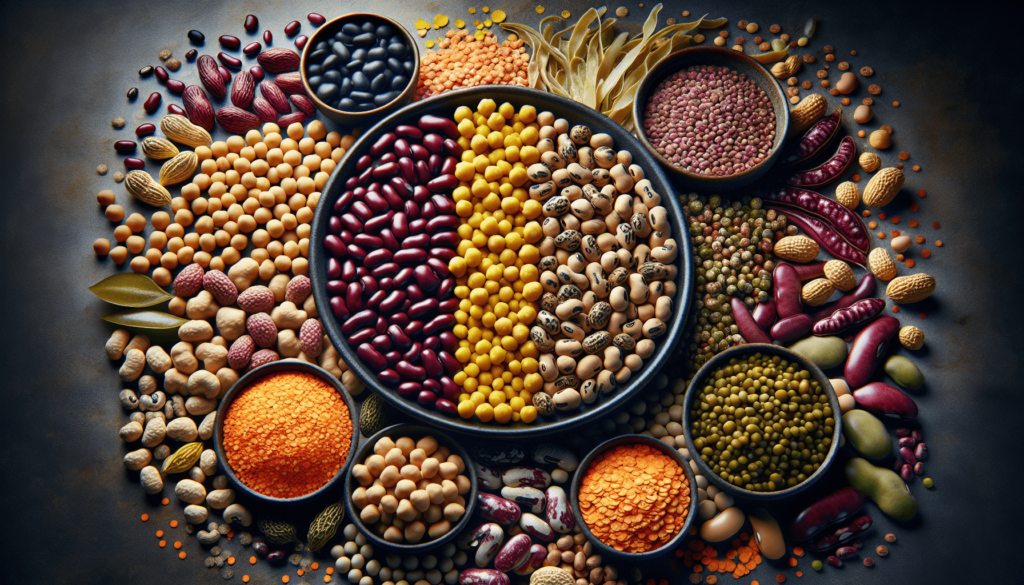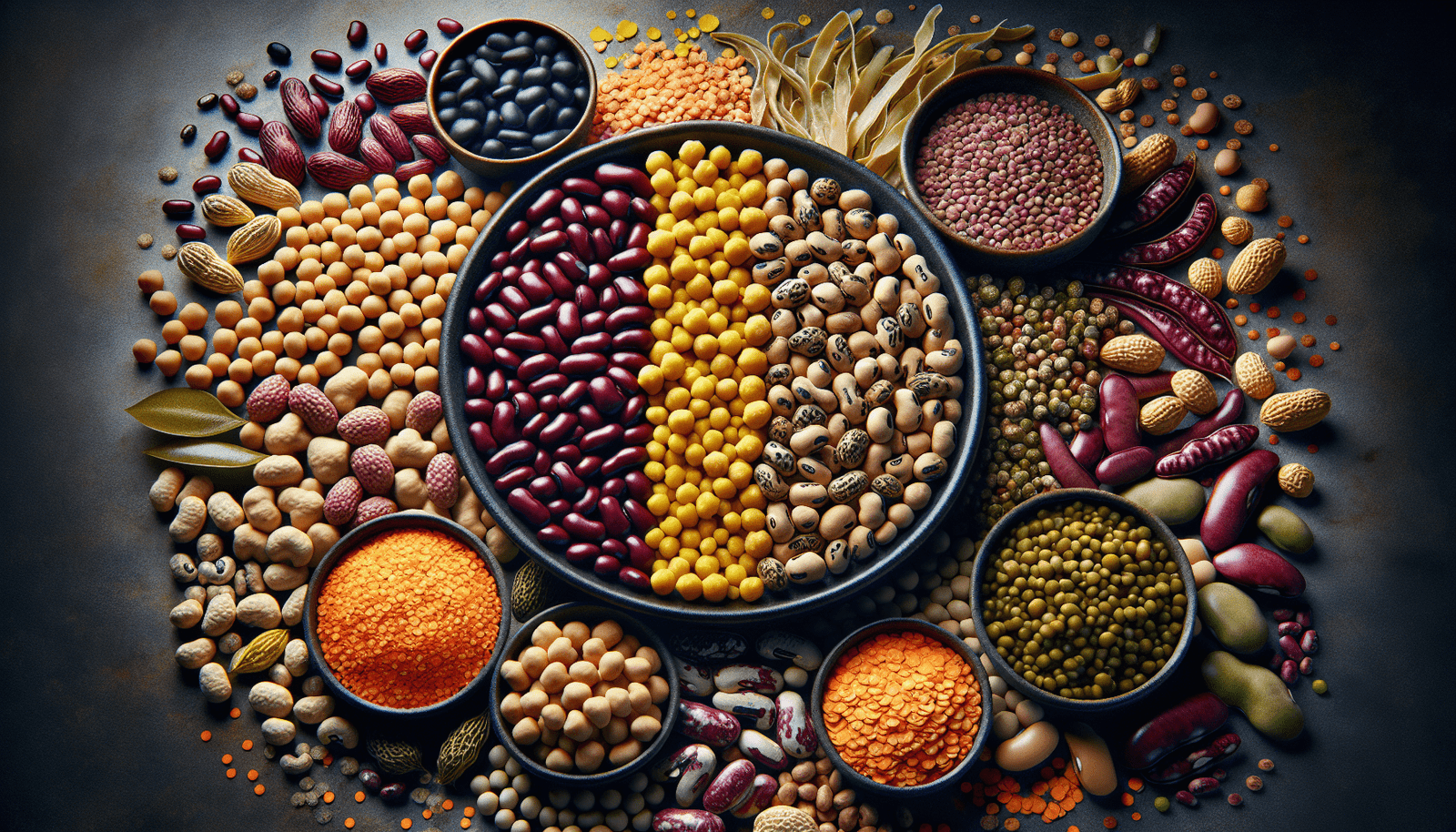Have you ever wondered if legumes could be the secret to reducing inflammation in the gut? Well, you’re not alone! Many people are curious about the potential benefits of legumes when it comes to soothing gut inflammation. In this article, we’ll explore the fascinating world of legumes and delve into the science behind their potential anti-inflammatory effects. So, grab a cup of tea and prepare to discover the potential gut-healing powers of legumes!

Introduction
Definition of legumes
Legumes are a class of plants that belong to the Fabaceae family. They are characterized by their seeds, which are found in pods. Legumes are an essential part of many diets around the world and are known for their high nutritional value.
Importance of gut health
Maintaining a healthy gut is crucial for overall well-being. The gut, or gastrointestinal tract, is responsible for various functions, including nutrient absorption and immune system regulation. It is home to trillions of bacteria, collectively known as the gut microbiota, which play a vital role in digestion, metabolism, and immune function.
Link between legumes and inflammation
Inflammation is a natural response of the immune system to injury or infection. However, chronic inflammation in the gut can lead to various health issues, such as inflammatory bowel disease (IBD) and irritable bowel syndrome (IBS). Research suggests that incorporating legumes into your diet may help reduce gut inflammation and promote a healthy gut.
What Are Legumes?
Definition and examples of legumes
Legumes encompass a wide variety of plants, including beans, lentils, chickpeas, and soybeans. These plants have pods that encase their seeds, which are the edible part of the legume. Some commonly consumed legumes include black beans, kidney beans, green lentils, chickpeas (also known as garbanzo beans), and edamame.
Nutritional profile of legumes
Legumes are a nutrient powerhouse. They are an excellent source of plant-based protein, fiber, vitamins, and minerals. They are low in fat and cholesterol-free, making them an ideal choice for those seeking a healthy diet. Legumes are rich in folate, iron, magnesium, and potassium, which are essential for various bodily functions.
Inflammation and Gut Health
Overview of inflammation in the gut
Inflammation in the gut can occur due to various factors, including infections, food sensitivities, and autoimmune disorders. When the immune system detects an irritant or a threat, it releases immune cells and chemicals that trigger an inflammatory response. In the short term, this response is beneficial, but chronic inflammation can damage the gut lining and disrupt its normal functioning.
Impact of inflammation on gut health
Chronic gut inflammation can lead to a range of digestive issues, including bloating, diarrhea, constipation, and abdominal pain. Prolonged inflammation can also increase the risk of developing more severe conditions, such as Crohn’s disease and ulcerative colitis. Maintaining a healthy gut environment is crucial for reducing inflammation and preventing these complications.
Common causes of gut inflammation
Several factors can contribute to gut inflammation, including a poor diet high in processed foods, sugar, and unhealthy fats. Food intolerances and sensitivities, such as lactose intolerance or gluten sensitivity, can also trigger inflammation. Additionally, stress, lack of sleep, and certain medications can play a role in gut inflammation.
Legumes and Their Potential Benefits
Fiber content in legumes
Legumes are an excellent source of dietary fiber. Fiber is a type of carbohydrate that the body cannot digest, but it plays a crucial role in supporting gut health. Legumes contain both soluble and insoluble fiber, which help regulate bowel movements, promote satiety, and provide a food source for beneficial gut bacteria.
Role of fiber in promoting gut health
Fiber acts as a prebiotic, meaning it provides nourishment for the beneficial bacteria in our gut. These bacteria ferment fiber and produce short-chain fatty acids, such as butyrate, which have anti-inflammatory properties and help maintain a healthy gut lining. By increasing fiber intake through legume consumption, you can support a thriving gut microbiota and reduce gut inflammation.
Anti-inflammatory properties of legumes
Legumes contain various compounds with anti-inflammatory properties, such as antioxidants, polyphenols, and phytochemicals. These bioactive compounds have been shown to reduce inflammation in the body, including in the gut. Regular consumption of legumes may help modulate the immune response, reducing the inflammatory burden on the gut.

Specific Legumes for Gut Health
Beans
Beans, including black beans, kidney beans, and pinto beans, are a versatile and nutritious legume option. They are rich in fiber, protein, and several essential minerals. Adding beans to your diet can help promote a healthy gut environment and reduce the risk of gut inflammation.
Lentils
Lentils come in various colors, including green, red, and black. They are an excellent source of plant-based protein and fiber. Lentils also contain high levels of folate and iron, which are important for overall health. Incorporating lentils into your meals can provide the gut with essential nutrients and promote gut health.
Chickpeas
Chickpeas, or garbanzo beans, are a staple in many cuisines and are incredibly versatile. They are packed with fiber, protein, and various vitamins and minerals. Chickpeas are known for their prebiotic properties, providing nourishment for the beneficial bacteria in the gut and promoting a healthy gut microbiota.
Soybeans
Soybeans are a complete source of plant-based protein, meaning they contain all the essential amino acids our bodies need. They are rich in isoflavones, which have been shown to have anti-inflammatory effects. Incorporating soybeans or soy-based products, such as tofu or tempeh, into your diet can support gut health and reduce inflammation.
Studies on Legumes and Gut Inflammation
Research findings
Multiple studies have explored the relationship between legume consumption and gut health. A study published in the Journal of Nutrition found that individuals who consumed legumes regularly had lower levels of inflammatory markers in their blood. Another study published in the British Journal of Nutrition demonstrated that a diet rich in legumes led to improvements in gut microbiota diversity and reduced gut inflammation.
Effects of legume consumption on gut health
Research suggests that regular consumption of legumes can help maintain a healthy gut environment and reduce inflammation. The fiber and bioactive compounds present in legumes contribute to these beneficial effects. By incorporating legumes into your diet, you can support a balanced gut ecosystem and protect against gut inflammation.
Mechanisms behind the anti-inflammatory effects
The anti-inflammatory effects of legumes can be attributed to several factors. The fiber content in legumes helps regulate bowel movements, reducing inflammation and promoting gut health. Additionally, the bioactive compounds present in legumes, such as antioxidants and phytochemicals, have been shown to modulate immune responses and reduce inflammation in the gut.
Incorporating Legumes into a Gut-Healthy Diet
Tips for incorporating legumes into meals
Incorporating legumes into your diet can be simple and delicious. You can add cooked legumes to salads, soups, or stir-fries for an extra boost of fiber and protein. Making bean-based dips or spreads, such as hummus or black bean dip, is another tasty way to include legumes in your meals. Experiment with different recipes and flavors to find your favorite legume dishes.
Recommended legume serving sizes
The recommended serving size of legumes varies depending on factors such as age, sex, and activity level. As a general guideline, aim for 1/2 to 1 cup of cooked legumes per day to reap the benefits for gut health. It’s essential to listen to your body and adjust the serving size based on your individual needs.
Potential side effects of legume consumption
While legumes are generally well-tolerated, some individuals may experience digestive discomfort, such as gas or bloating, after consuming larger amounts due to the fiber content. To minimize these side effects, start by introducing small amounts of legumes and gradually increase your intake as your digestive system adjusts. Proper cooking and soaking of legumes can also help improve their digestibility.
Other Strategies for Reducing Gut Inflammation
Importance of a balanced diet
In addition to incorporating legumes, maintaining a balanced diet is crucial for reducing gut inflammation. Focus on consuming a variety of whole, unprocessed foods, such as fruits, vegetables, whole grains, lean proteins, and healthy fats. Limit your intake of processed foods, refined sugars, and unhealthy fats, as these can contribute to gut inflammation.
Role of probiotics and fermented foods
Probiotics are beneficial bacteria that can support a healthy gut microbiota. Incorporating probiotic-rich foods, such as yogurt, kefir, sauerkraut, and kimchi, into your diet can help improve gut health and reduce inflammation. Fermented foods also provide additional prebiotics, which can further support the growth of beneficial gut bacteria.
Avoidance of trigger foods
Identifying and avoiding trigger foods that can aggravate gut inflammation is essential. Common trigger foods include gluten, dairy, processed foods, and artificial additives. Keeping a food diary and paying attention to how certain foods make you feel can help you identify your personal triggers and make informed dietary choices.
Consulting a Healthcare Professional
Importance of personalized advice
It is important to remember that everyone’s gut health is unique, and what works for one person may not work for another. If you have specific gut health concerns or chronic digestive issues, it is advisable to consult with a healthcare professional or a registered dietitian. They can provide personalized advice tailored to your needs and help you develop a gut-healthy diet plan.
Seeking guidance for gut health concerns
If you are experiencing persistent gut health issues, such as recurring inflammation or digestive discomfort, it is essential to seek guidance from a healthcare professional. They can evaluate your symptoms, conduct necessary tests, and provide you with appropriate treatment options. Taking proactive steps towards improving your gut health can have a positive impact on your overall well-being.
Conclusion
Summary of legume benefits for gut health
Legumes are an excellent addition to a gut-healthy diet. Their high fiber content, anti-inflammatory properties, and nutrient density make them a powerful tool in reducing gut inflammation. By incorporating legumes into your meals, you can support a thriving gut microbiota, regulate bowel movements, and protect against chronic gut inflammation.
Importance of maintaining a healthy gut
Maintaining a healthy gut is crucial for overall health and well-being. By prioritizing gut health through a balanced diet, incorporating legumes, and adopting other gut-friendly strategies, you can reduce inflammation, support digestion, and promote optimal gut function. Remember, a healthy gut is the foundation for good health, so take care of your gut, and it will take care of you.

